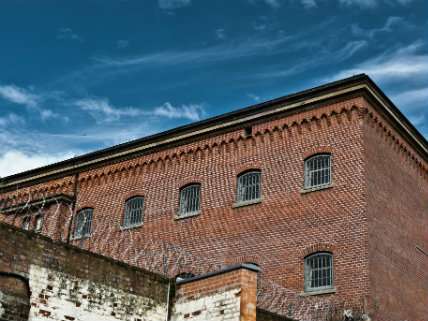Paul Ryan's Poverty Plan: Why Are Liberals Ignoring the Criminal Justice Reform Aspect?

Type "Paul Ryan poverty" into Google and you'll turn up pages upon pages of recent news hits. The Republican representative's plan for "Expanding Opportunity in America" was released July 24, and since then there have been no shortage of writers and pundits both criticizing and praising Ryan's proposals. Conspicuously absent from critics' responses, however, has been much if any discussion of the plan's criminal justice reform elements.
To me, these are by far the most exciting parts of Ryan's agenda. When is the last time an American politician brought up criminal justice reform in the context of poverty policy proposals? And yet a huge part of what keeps people poor is our draconian criminal justice system. As of 2008, one in every 100 people in America was in prison. We throw people in jail for the most insane reasons—possessing pot, having sex, street vending without proper paperwork—thereby already putting them (and their families) in economic jeopardy. And then we release them into a system where over-eager cops, parole officers, and bureaucrats are on the ready to issue fines or haul them back into prison should they fail to meet any number of labyrinthian requirements.
The link between poverty and over-aggressive incarceration in the U.S. is undeniable. "During the past decade, researchers have identified serious individual and community-level harms attributable to rising incarceration," write Robert DeFina and Lance Hannon, professors of criminology and sociology at Villanova University.
Our own work offers evidence that mass incarceration has, over time, significantly increased poverty. In many ways, this finding is unsurprising. A criminal record, for example, has been shown to decrease the likelihood of landing a job and to reduce both the level and growth of wages. And in many states, a criminal record means reduced access to the social safety net and to licenses for certain types of professions. The economic harm extends to offenders' spouses and partners, who themselves often have a harder time getting and holding a job, due to the logistical difficulties of being in a relationship with someone in prison or jail.
In a 2010 paper coordinated by the American Academy of Arts and Sciences, a team of leading criminologists argued that mass incarceration is highly linked to growing inequality in the United States.
Obviously criminal justice reform alone won't end poverty, but it could help make a serious dent. And it could theoretically draw much more bipartisan support than hotly-contested ideas like reforming the tax code or social safety net. Conservative and liberal legislators in Congress have already been working together to push for sentencing reform.
Yet many Democratic politicians are strangely quiet on the subject, as were liberal critics of Ryan's poverty plan. To read many critiques, you might not even know there was a criminal justice reform element to his proposals. See: Jamelle Bouie at Slate, Annie Lowrey at New York, E.J. Dionne Jr. at The Washington Post, John Nichols at The Nation, and Pat LaMarche at The Huffington Post, to list just a few examples.
I'm not expecting these people to fawn over Ryan's poverty plan or ignore areas of disagreement—there's a lot to dislike in it, from a progressive or a libertarian perspective. But let's give credit where credit is due. Would it have killed folks to highlight some ways Ryan may have gotten it right? (Credit where credit is due: Nicole Flatow at Think Progress did just this. Update: also Jon Walker at Firedoglake.)
Of course, maybe these folks don't agree on the criminal justice elements; maybe they're opposed to sentencing reform, or think our prison-industrial complex has no bearing on poverty in America. But if that's the case, why not say so? Why not condemn these reform ideas, too? The fact that they didn't even mention them—while tending to support criminal justice reform under other circumstances—makes me think the omission isn't innocent but pure partisan posturing.
And this is what infuriates me about hyper-partisans, be they politicians, pundits, or your mom. At some point actual people have to matter more than winning the news cycle. At some point you have to demonstrate that you actually give a fuck about the people more than the politics. And this is seen all too rarely, on either side of the left-right divide.
People like to talk about how libertarians are selfish. How we all worship Ayn Rand and do the bidding of billionaires and want to make the poor polish our monocles while we're privatizing the roads. There's a myopic tendency to assume that just because we don't come to the same conclusions about how to help the poor (or the world), we don't care.
Take a look at the kinds of things Reason regularly covers: police abuse, criminal justice reform, sex work, civil liberties, parents' rights, stopping U.S. warmongering, ending regulations that make it harder for the poor and middle class to make a living, opening the borders indiscriminately. We care. Take a look at the guaranteed-basic-income supporting folks at Bleeding Heart Libertarians, the work done by people like Radley Balko and Maggie McNeill, the crusaders at IJ and Families Against Mandatory Minimums. They care. Take a look at Paul Ryan's poverty plan. The criminal-justice and occupational-liscening reform elements are ways of caring.
Does Paul Ryan really care? I have no idea. And I don't care about that. I will take action-oriented allies where I can get them, no matter whether their motives are pure or we vehemently disagree elsewhere. Because I'm not interested in writing libertopian fanfic. I'm interested in how we can actually help people economically and actually make people more free, given current realities and constraints. I'm not willing to overlook the good in the favor of the perfect, and I wish I could say the same for more people working on and covering Capitol Hill.


Show Comments (52)